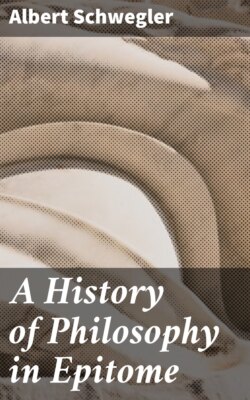Читать книгу A History of Philosophy in Epitome - Albert Schwegler - Страница 11
На сайте Литреса книга снята с продажи.
SECTION VIII.
EMPEDOCLES.
ОглавлениеTable of Contents
1. General View.—Empedocles was born at Agrigentum, and is extolled by the ancients as a natural philosopher, physician and poet, and also as a seer and worker of miracles. He flourished about 440 BC, and was consequently younger than Parmenides and Heraclitus. He wrote a doctrinal poem concerning nature, which has been preserved to us in tolerably complete fragments. His philosophical system may be characterized in brief, as an attempt to combine the Eleatic being and the Heraclitic becoming. Starting with the Eleatic thought, that neither any thing which had previously been could become, nor any thing which now is could depart, he sets up as unchangeable being, four eternal original materials, which, though divisible, were independent, and underived from each other. In this we have what in our day are called the four elements. With this Eleatic thought he united also the Heraclitic view of nature, and suffered his four elements to become mingled together, and to receive a form by the working of two moving powers, which he names unifying friendship and dividing strife. Originally, these four elements were absolutely alike and unmovable, dwelling together in a divine sphere where friendship united them, until gradually strife pressing from the circumference to the centre of the sphere (i.e. attaining a separating activity), broke this union, and the formation of the world immediately began as the result.
2. The Four Elements.—With his doctrine of the four elements, Empedocles, on the one side, may be joined to the series of the Ionic philosophers, but, on the other, he is excluded from this by his assuming the original elements to be four. He is distinctly said by the ancients to have originated the theory of the four elements. He is more definitely distinguished from the old Ionics, from the fact that he ascribed to his four “root-elements” a changeless being, by virtue of which they neither arose from each other nor departed into each other, and were capable of no change of essence but only of a change of state. Every thing which is called arising and departing, every change rests therefore only upon the mingling and withdrawing of these eternal and fundamental materials; the inexhaustible manifoldness of being rests upon the different proportions in which these elements are mingled. Every becoming is conceived as such only as a change of place. In this we have a mechanical in opposition to a dynamic explanation of nature.
3. The Two Powers.—Whence now can arise any becoming, if in matter itself there is found no principle to account for the change? Since Empedocles did not, like the Eleatics, deny that there was change, nor yet, like Heraclitus, introduce it in his matter, as an indwelling principle, so there was no other course left him but to place, by the side of his matter, a moving power. The opposition of the one and the many which had been set up by his predecessors, and which demanded an explanation, led him to ascribe to this moving power, two originally diverse directions, viz.: repulsion and attraction. The separation of the one into the many, and the union again of the many into the one, had indicated an opposition of powers which Heraclitus had already recognized. While now Parmenides starting from the one had made love as his principle, and Heraclitus starting from the many had made strife as his, Empedocles combines the two as the principle of his philosophy. The difficulty is, he has not sufficiently limited in respect to one another, the sphere of operation of these two directions of his power. Although, to friendship belonged peculiarly the attractive, and to strife the repelling function, yet does Empedocles, on the other hand, suffer his strife to have in the formation of the world a unifying, and his friendship a dividing effect. In fact, the complete separation of a dividing and unifying power in the movement of the becoming, is an unmaintainable abstraction.
4. Relation of the Empedoclean to the Eleatic and Heraclitic Philosophy.—Empedocles, by placing, as the principle of the becoming, a moving power by the side of his matter, makes his philosophy a mediation of the Eleatic and Heraclitic principles, or more properly a placing of them side by side. He has interwoven these two principles in equal proportions in his system. With the Eleatics he denied all arising and departing, i.e. the transition of being into not-being and of not-being into being, and with Heraclitus he shared the interest to find an explanation for change. From the former he derived the abiding, unchangeable being of his fundamental matter, and from the latter the principle of the moving power. With the Eleatics, in fine, he considered the true being in an original and indistinguishable unity as a sphere, and with Heraclitus, he regarded the present world as a constant product of striving powers and oppositions. He has, therefore, been properly called an Eclectic, who has united the fundamental thoughts of his two predecessors, though not always in a logical way.
